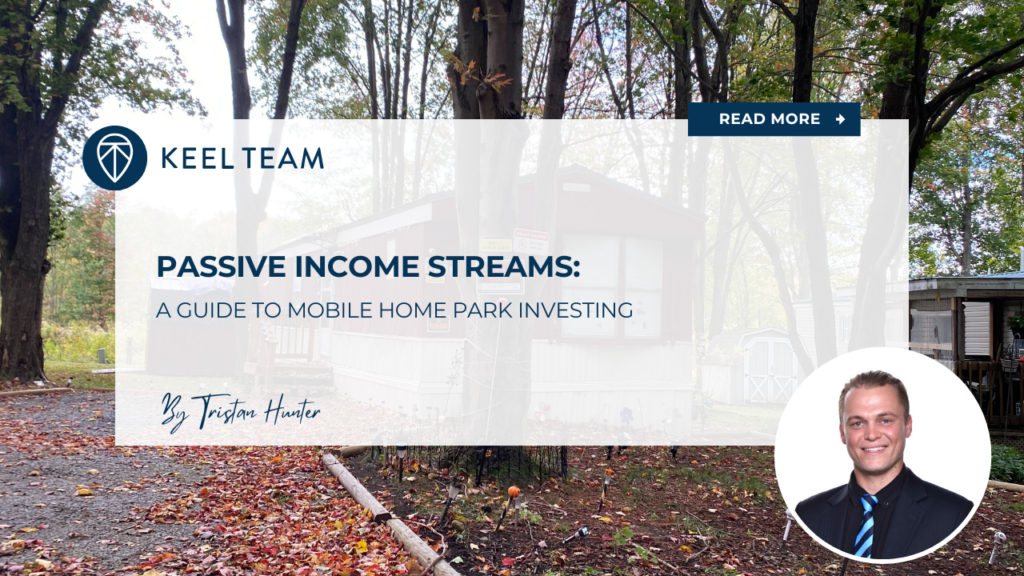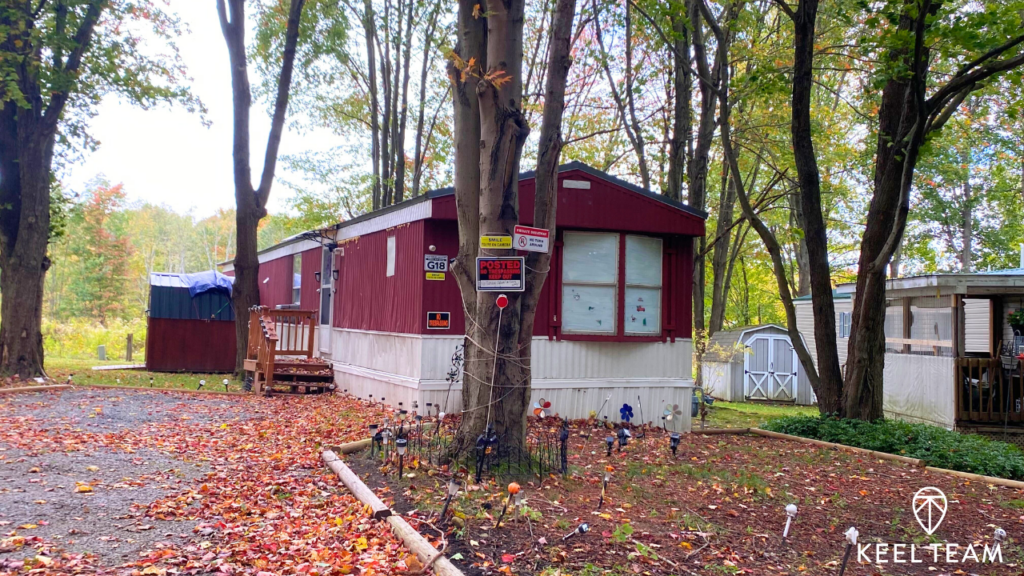Passive Income Streams: A Guide to Mobile Home Park Investing
-
 Tristan Hunter - Investor Relations
Tristan Hunter - Investor Relations

Passive income has become a key goal for many investors. Mobile home park investing offers an opportunity to achieve that goal. This guide will outline steps for first-time investors to enter the market. It will also highlight the typical benefits of partnering with experienced operators to maximize success potential.
Understanding Mobile Home Park Investing
Mobile home park investing has unique qualities that make it attractive for passive income. These properties tend to have low operational costs. They also often attract long-term tenants who value affordable housing options.
Unlike traditional real estate, mobile home parks usually focus on renting land rather than physical homes. This reduces maintenance responsibilities for owners. When structured well, these investments might provide steady cash flow with less effort than other properties.
Steps to Enter the Mobile Home Park Market
For first-time investors, starting with mobile home parks can feel overwhelming. Following these steps might help simplify the process.
1. Research the Industry
Begin by learning about the mobile home park asset class. Study market trends, demand for affordable housing, and typical investment returns.
Understanding the basics can help build your confidence. Look for resources like books, blogs, and webinars. These can provide insight into the challenges and opportunities within this niche market.
2. Set Your Investment Goals
Before diving in, clarify your goals. Are you seeking long-term passive income or a quick return on investment?
Having clear goals can guide your decisions. For example, some investors prefer stabilized assets with predictable returns. Others might target value-add properties requiring improvements to boost income potential.
3. Assess Your Finances
Evaluate your financial situation to determine how much you can invest. Mobile home parks often require a substantial down payment.
Consider whether you’ll invest alone or pool resources with others. Partnerships or syndications might make larger deals more accessible.
4. Find a Suitable Market
Location matters when investing in mobile home parks. Look for areas with strong demand for affordable housing.
Pay attention to population growth, employment opportunities, and local regulations. These factors can influence the properties profitability.
5. Work with a Broker
Mobile home park brokers specialize in these types of properties. They can connect you with listings that align with your goals.
A broker might also provide valuable advice on pricing and market trends. They can be an excellent resource for first-time investors.
6. Conduct Due Diligence
Thorough research can be critical before purchasing a mobile home park. Investigate the property’s condition, tenant history, and financial performance.
Hire professionals to inspect infrastructure like water systems and roads. Reviewing leases and legal documents can also uncover potential risks.
7. Secure Financing
Mobile home park loans often differ from traditional mortgages. Lenders may require a higher down payment or stricter qualifications.
Explore financing options like bank loans, private lenders, or seller financing. Choosing the right option can significantly impact your cash flow.
8. Consider Partnering with an Operator
For new investors, working with an experienced operator can simplify the process. These professionals typically manage day-to-day operations and can optimize the trailer park’s performance.
We’ll explore the benefits of this approach in more detail below.
Download our FREE eBook on the Top 20 things to know BEFORE investing in mobile home parks!
Why Partner with an Experienced Operator?
Investing in mobile home parks involves managing various complexities. Partnering with an experienced operator can ease these challenges. Here are some potential benefits of this strategy:
1. Access to Industry Expertise
Experienced operators usually have deep knowledge of the mobile home park industry. They understand tenant management, property maintenance, and legal compliance.
By working with them, you can avoid common mistakes. This might help protect your investment and ensure smoother operations.
2. Stronger Negotiation Power
Operators often have established relationships with brokers and sellers. This can lead to better pricing or favorable terms on a deal.
Their reputation and experience might also give you an edge in competitive markets.
3. Hands-Off Management
Managing a mobile home park requires time and effort. Tasks include collecting rent, resolving disputes, and overseeing maintenance.
Operators usually handle these responsibilities on your behalf. This allows you to enjoy passive income potential without being involved in daily operations.
4. Improved Profitability
Experienced operators often identify ways to increase a mobile home park’s value. For example, they might implement utility bill-backs or adjust rents strategically.
Their expertise could lead to higher income and stronger long-term returns.
5. Shared Risk
When you partner with an operator, you share both the potential risks and rewards. This can make investing in larger or more complex properties less intimidating.
For first-time investors, this approach may provide peace of mind.

Tips for Choosing the Right Operator
Selecting the right partner is crucial for success. Keep these tips in mind when evaluating operators:
- Check Their Track Record: Look for operators with proven success in managing mobile home parks.
- Review Their Communication Style: Choose someone who is transparent and responsive. Clear communication fosters trust.
- Understand Their Fee Structure: Ensure you know how the operator will be compensated. This might include a management fee or a percentage of potential profits.
- Request References: Speak with other investors who have worked with the operator to understand their experience.
Potential Challenges to Consider
While mobile home park investments offer many advantages, they are not without challenges. First-time investors should be aware of these potential hurdles:
- Regulatory Issues: Local zoning laws and tenant protections can impact profitability.
- Tenant Management: Ensuring timely rent payments and resolving disputes requires careful attention.
- Infrastructure Costs: Repairs to aging water, sewer, or electrical systems can be expensive.
Partnering with an experienced operator can help mitigate these challenges.
Maximizing Passive Income
To maximize your returns, consider these strategies:
- Focus on Occupancy Rates: Keep the property as full as possible. A well-maintained park with affordable lot rents can attract long-term tenants.
- Control Costs: Implement utility bill-backs and regularly review expenses. Keeping costs low can increase NOI.
- Invest in Value-Add Opportunities: Look for properties with untapped value-add potential, such as infilling vacant lots, adding amenities or updating infrastructure.
These strategies, combined with efficient, third-party management, might lead to consistent passive income.
Final Thoughts
Creating passive income with mobile home parks can be a rewarding endeavor. For first-time investors, the process might seem complex, but following the outlined steps can simplify your journey.
Research the market, set clear goals, and consider working with experienced operators. By leveraging their expertise, you can navigate challenges and potentially optimize your investment.
Mobile home parks offer a unique opportunity to achieve financial independence. With the right approach, you may create a potentially reliable stream of passive income for years to come.
Are you looking for MORE information? Book a 1-on-1 consultation with Andrew Keel to discuss:
- A mobile home park deal review
- Due diligence questions
- How to raise capital from investors
- Mistakes to avoid, and more!
Disclaimer:
The information provided is for informational purposes only and is not investment advice or a guarantee of any kind. We do not guarantee profitability. Make investment decisions based on your own research and consult registered financial and legal professionals. We are not registered financial or legal professionals and do not provide personalized investment recommendations.

Tristan Hunter - Investor Relations
View The Previous or Next Post
Subscribe Below 👇





